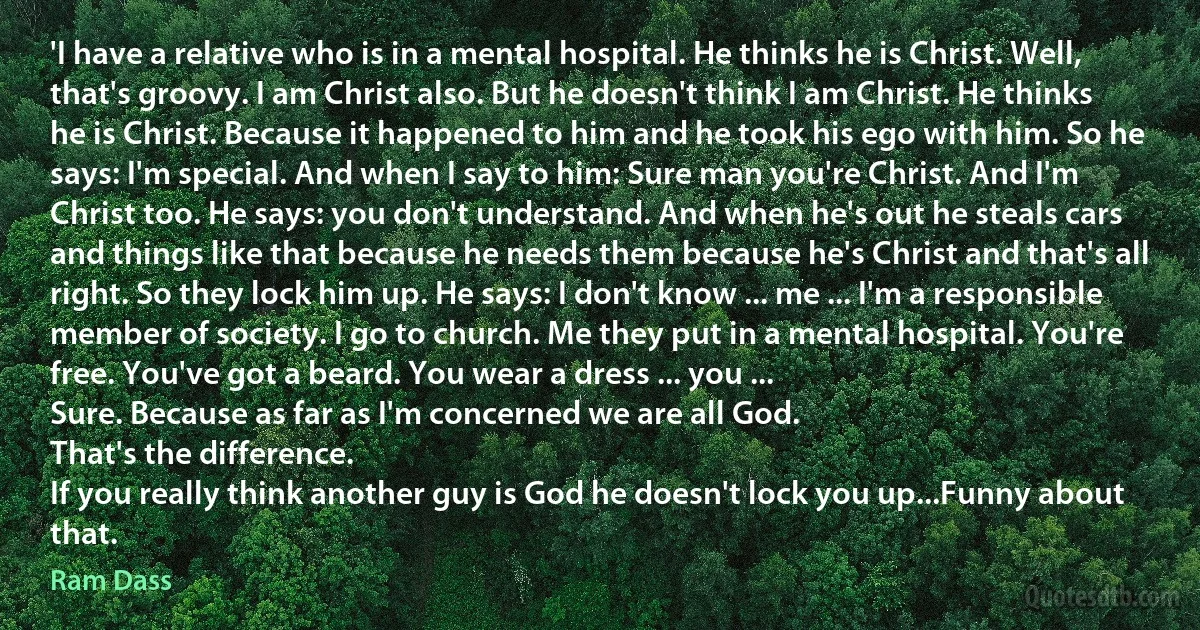
'I have a relative who is in a mental hospital. He thinks he is Christ. Well, that's groovy. I am Christ also. But he doesn't think I am Christ. He thinks he is Christ. Because it happened to him and he took his ego with him. So he says: I'm special. And when I say to him: Sure man you're Christ. And I'm Christ too. He says: you don't understand. And when he's out he steals cars and things like that because he needs them because he's Christ and that's all right. So they lock him up. He says: I don't know ... me ... I'm a responsible member of society. I go to church. Me they put in a mental hospital. You're free. You've got a beard. You wear a dress ... you ... Sure. Because as far as I'm concerned we are all God. That's the difference. If you really think another guy is God he doesn't lock you up...Funny about that.
Ram DassRelated topics
beard christ church difference dress far free lock man needs right say sure take think wear well groovy things stealsRelated quotes
They are always talking about the fire of hell, but no one has ever seen it, my friends. For hell is cold. It used to be that the nights weren't long enough to wear out your malice, and you got up each morning with your breasts still full of poison. But now the devil himself has withdrawn from you. Ah, how alone we are in evil, my brothers! The poor human race dreams from century to century of breaking that solitude - but it's no use! The devil, who can do so many things, will never succeed in founding a Church, a Church that will put in common both the merits of hell and the sin of all. From now until the end of the world, the sinner will have to sin alone, always alone - for just as we die alone, so also do we sin alone. The devil, you see, is the friend who never stays with us to the end.

Georges Bernanos
And as for the close connection between philosophy and poetry, we can refer to a little-known statement by Thomas Aquinas in his Commentary on Aristotle's Metaphysics [I, 3]: the Philosopher is akin to the Poet in this, that both are concerned with the mirandum, the "wondrous," the astonishing, or whatever calls for astonishment or wonder. This statement is not that easy to fathom, since Thomas, like Aristotle, was a very sober thinker, completely opposed to any Romantic confusion of properly distinct realms. But on the basis of their common orientation towards the "wonderful" (the mirandum - something not to be found in the world of work!) - on this basis, then, of this common transcending-power, the philosophical act is related to the "wonderful," is in fact more closely related to it than to the exact, special sciences; to this point we shall return.

Josef Pieper
This connection, at once semantic and conceptual, between unorthodoxy and sodomy, was firmly established during the late Middle Ages, and has never been severed. It is as strong today as it was six hundred years ago. To be stigmatized as a heretic or bugger in the fourteenth century was to cast out of society. Since the dominant ideology was theological, religious deviance was considered so grave an offense as to render the individual a nonperson. Whatever redeeming qualities he might have had counted for naught. The sin of heresy eclipsed all contradictory, personal characteristics, just as the teachings of God and the Church eclipsed all contradictory empirical observations. The disease called "mental illness”-and its subspecies "homosexuality”-plays the same role today.

Thomas Szasz
Since God has been carrying on His dispensation through the Christian church, He and we are responsible to convey this message to the Christians first. Until our mission with the Christian church is over, we must quote the Bible and use it to explain the Divine Principle. After we receive the inheritance of the Christian church, we will be free to teach without the Bible. Now, however, our primary mission is to witness to the Christian church. When they recognize and accept our movement, the world restoration will be very easy. So go to the Christians. In reality, Christians are quicker to understand the Principle than non-Christians. Sometimes non-Christians may accept it quickly, but it is hard to put the roots into deep soil. They accept for a few days, then run away.

Sun Myung Moon
Justice is the end of government. It is the end of civil society. It ever has been, and ever will be, pursued, until it be obtained, or until liberty be lost in the pursuit. In a society, under the forms of which the stronger faction can readily unite and oppress the weaker, anarchy may as truly be said to reign, as in a state of nature where the weaker individual is not secured against the violence of the stronger: And as in the latter state even the stronger individuals are prompted by the uncertainty of their condition, to submit to a government which may protect the weak, as well as themselves: so in the former state, will the more powerful factions be gradually induced by a like motive, to wish for a government which will protect all parties, the weaker as well as the more powerful.

Alexander Hamilton
